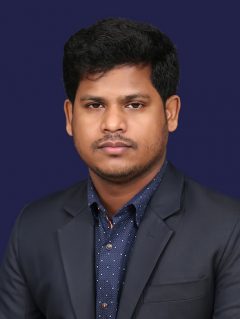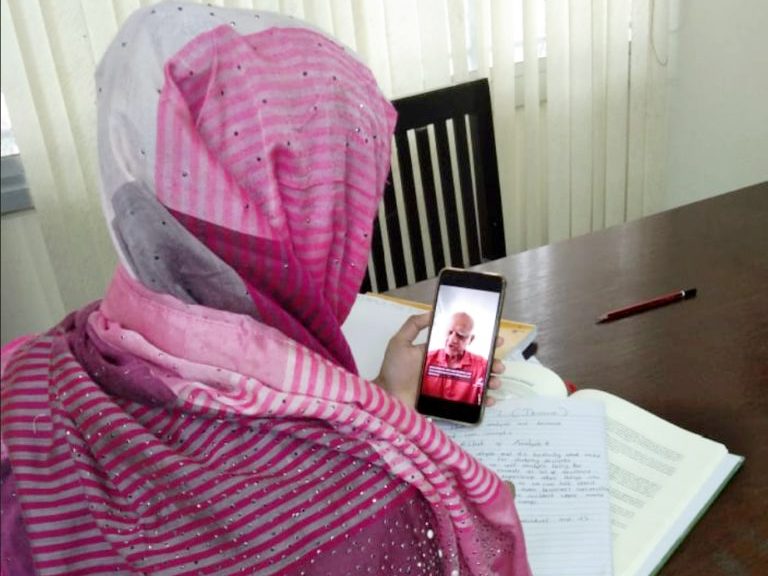Professor of Sociology Tom Arcaro and Trevor Molin ’23 worked with faculty at Brac University in Bangladesh to deliver an online introductory sociology course to area students and Rohingya refugees
An Elon professor and undergraduate partnered with Bangladesh’s Brac University’s Centre for Peace and Justice this summer to teach sociology to Bangladeshi and Rohingya refugees.
Professor of Sociology Tom Arcaro taught Introduction to Sociology to 20 students this summer — 14 Rohingya refugees in the world’s largest refugee camp and six Bangladeshi residents — in a 10-week virtual course. Arcaro worked closely with Azizul Hoque, a research associate with the Centre for Peace and Justice, who worked as an interpreter for Bengali and Rohingya speakers and co-teacher. Trevor Molin ’23, a political science and economics double major, facilitated by producing video lectures and materials for the course.

The introductory sociology course was a pilot the Centre for Peace and Justice will use to evaluate the impact of similar courses and plan future learning opportunities for marginalized populations.
“This class has become something much larger than we expected,” Arcaro said. “It’s the most interesting class I’ve ever taught.”
Each week since May 27, the 20 students watched instructional videos supplied by Arcaro and Molin and tuned in on cell phones for live classes that became deep discussions around social forces and power dynamics. Between classes, Hoque met virtually with students to guide them through the concepts. A patchwork of social media platforms allowed everyone to communicate.
“They are discovering themselves every day as they learn about effects related to power, social stratification and inequality,” Hoque said. “At the beginning, we gave them small pieces of information. As they dove into this ocean of knowledge, they became even more motivated. We gave them more and longer videos, printed a textbook for them. It went from a small level to a larger level.”

Because of the time difference, the live class was typically held at 6 a.m. EST and 4 p.m. in Bangladesh. Students’ living conditions posed additional obstacles. The refugee camp doesn’t have Wi-Fi. Students relied on mobile reception and unreliable sources of electricity to participate. This spring, deadly fires displaced many of the estimated 1 million people in the Cox’s Bazar refugee camp. Just last week, heavy rains brought devastating floods to the area. Students shared photos on WhatsApp of themselves chest deep in flood waters, prompting postponement of that class to this Monday.
“We have our challenges,” Arcaro said, “but the overall vibe of the class is that our time together is extraordinarily valuable, and we all do what we can to make our class happen.”
The Centre for Peace and Justice promotes solutions to global social issues including fragility, conflict and violence. The center has been researching conditions and needs in the Cox’ Bazar encampments for a number of years and has worked to promote educational opportunities for children and adults there. Arcaro and Hoque were introduced during a WhatsApp chat with Rohingya refugees last fall. Hoque served as interpreter for that discussion about educational opportunities, which eventually led to this summer’s course.
Hoque has facilitated other collaborative courses inside the Cox’s Bazar camps and in Bangladeshi communities. He’s seen learned knowledge spread through communities and hopes the concepts taught this summer will travel similarly.

“These initiatives have a domino effect in the communities where learners independently educate their friends, peers, and the camp’s people creating small learning pods, which is very fascinating to me,” Hoque said. “It will accelerate the localization of knowledge in Bangladeshi host and Myanmar’s Rohingya communities where they will create their version of sociology.”
When the course began, some students had never heard of the social sciences. At one point, Arcaro and Hoque discovered there was no Rohingya word for “colonialism,” or the act of a powerful nation exploiting a region and its people. Hoque described the concept to them as best he could. Arcaro and Molin were sobered to learn that people whose lives are so affected by colonialism wouldn’t have a term for it.
“I’ve had to reconsider every example and concept I use,” said Arcaro, whose research is focused stratifying forces in society he equates to the mythological hydra. “It’s made me so much more aware of the nature of the hydra, of privileging forces and their impact on people’s lives. It’s not abstract: These are victims of genocide.”
Molin said that meeting the students and learning about their lives and societies changed his understanding of the world. He hopes students feel the same about the course subjects.
“This course might not change their lives in any material way, but maybe changing the way they think will lead to them changing things in the future or helping others,” he said.

Molin’s involvement is an example of the kinds of experiences available to Elon undergraduates when they show interest and form relationships with professors, Arcaro said. He had completed Arcaro’s Global Social Issues course this spring as the possibility of delivering a course to underprivileged and refugee populations arose. The video production began as part of the course’s service-learning component but ended with him volunteering to assist this summer.
“It’s a very Elon thing in the way it happened,” Molin said. “It came from a conversation with a professor outside my major, and it shows how these little interactions we have can reach beyond college and campus. Even though this project isn’t related to my career interests, this experience has changed the way I think about the world and probably what I will do after Elon.”
Molin is enrolled in a two-hour independent study this fall to work with Arcaro and Hoque to present their findings to the Centre for Peace and Justice and to publish papers and articles about the experience.

The course will end later this month with students writing essays describing how the topics covered have affected the way they view themselves and the world around them. Arcaro and Hoque eagerly await those reflections.
“These learners are exceptional people just to be able to get into the class, but they are not going to become sociologists or academics,” Arcaro said. “This will give them some critical thinking skills and ways of looking at the world that will enable them to be better assets to their community.”
“This is a situation where the teachers are getting so much more from the experience than we’re giving. It’s freed my mind to explain things in ways that I never would have come up with otherwise.”
Arcaro’s forthcoming book, “Understanding and Taming the Hydra,” will conclude with chapters featuring responses to questions and comments from the Rohingya and Bangladeshi learners, as well as reflections from Hoque and Molin.



